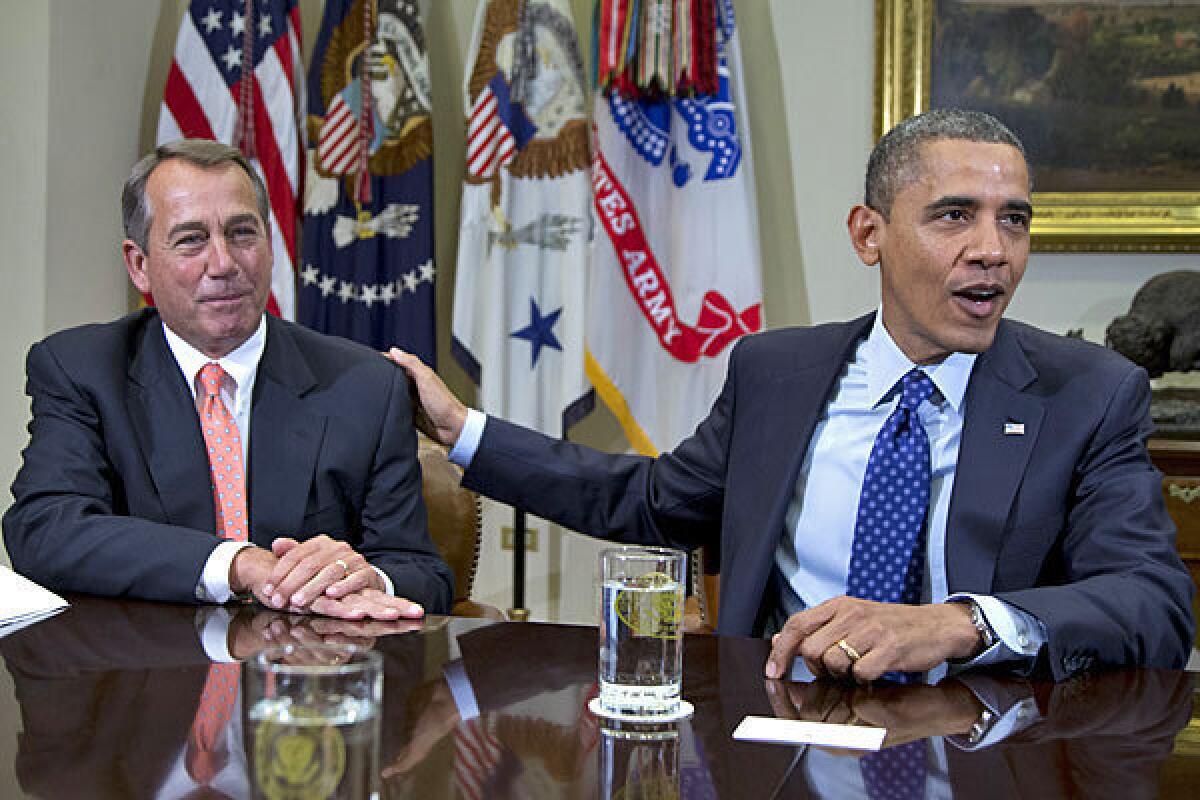‘Fiscal cliff’ deal closer as Obama-Boehner talks accelerate

WASHINGTON — Negotiations to prevent the year-end budget crisis accelerated Monday as President Obama and House Speaker John A. Boehner convened privately at the White House in what was widely regarded as a sign that a deal could be within reach.
Differences remain, but the quickened pace of the talks, with new offers from both sides, suggested a serious effort to cut through the partisan divide and strike an agreement.
Obama made a counteroffer that brought the two even closer together. The president offered to raise rates only on income above $400,000, according to a source familiar with the talks who was not authorized to speak publicly about the negotiations.
PHOTOS: Notable moments of the 2012 presidential election
The president’s offer came after Boehner suggested late last week he would be willing to raise taxes on those earning more than $1 million — a substantial break from the Ohio Republican’s resistance to higher rates. With Monday’s proposal, the president dropped his insistence that tax rates must rise on households earning more than $250,000 a year.
The latest offer from the White House would produce $1.2 trillion in new revenue over the decade to be matched with a similar amount of spending cuts as the president reaches for a large-scale deficit reduction deal. The cuts would include reductions to the healthcare and domestic safety net programs, proposals that have made Democrats uneasy. One change would trim the annual cost-of-living adjustment for those receiving government assistance.
The pace of the talks and the optimism expressed by aides on both sides seemed to indicate “a more robust level of engagement” than the two sides have seen before, said one senior administration official who requested anonymity to discuss White House thinking about the talks.
Boehner will meet Tuesday morning with rank-and-file GOP lawmakers, where he is expected to air the latest proposals and gauge the reaction — particularly from his conservative flank, which has been resistant to any deal that would increase tax rates.
Failure to reach consensus by year’s end would result in $500 billion in automatic tax hikes and spending cuts that both sides are trying to avoid.
Monday was scheduled to be the start of the holiday season for Congress. The House had planned to be in recess. Instead, lawmakers are returning to Washington the week before Christmas.
Boehner and Obama talked Friday, when the House speaker made his latest offer, and Monday’s meeting at the White House was the third direct talk between the two in just more than a week.
Over the weekend, Boehner made a substantial shift by offering to raise tax rates on those making more than $1 million a year, a significant change from Republican orthodoxy, which opposes higher rates. Aides were optimistic about the overture, even though the White House did not accept it.
The speaker also offered to resolve the difficult issue of raising the nation’s debt ceiling, which will be needed early next year to continue paying the accumulated bills. Boehner offered to increase the borrowing capacity for another year if the White House agreed to an equal amount of spending cuts.
Obama’s new offer seeks a two-year extension of the debt ceiling, which would be difficult for Boehner’s conservative Republicans to accept.
Key to any deal will be whether Boehner decides to proceed even if he loses a substantial number of defectors. The first vote of the new Congress, on Jan. 3, will be to choose the new speaker.
QUIZ: How much do you know about the ‘fiscal cliff’?
More to Read
Get the L.A. Times Politics newsletter
Deeply reported insights into legislation, politics and policy from Sacramento, Washington and beyond. In your inbox three times per week.
You may occasionally receive promotional content from the Los Angeles Times.












